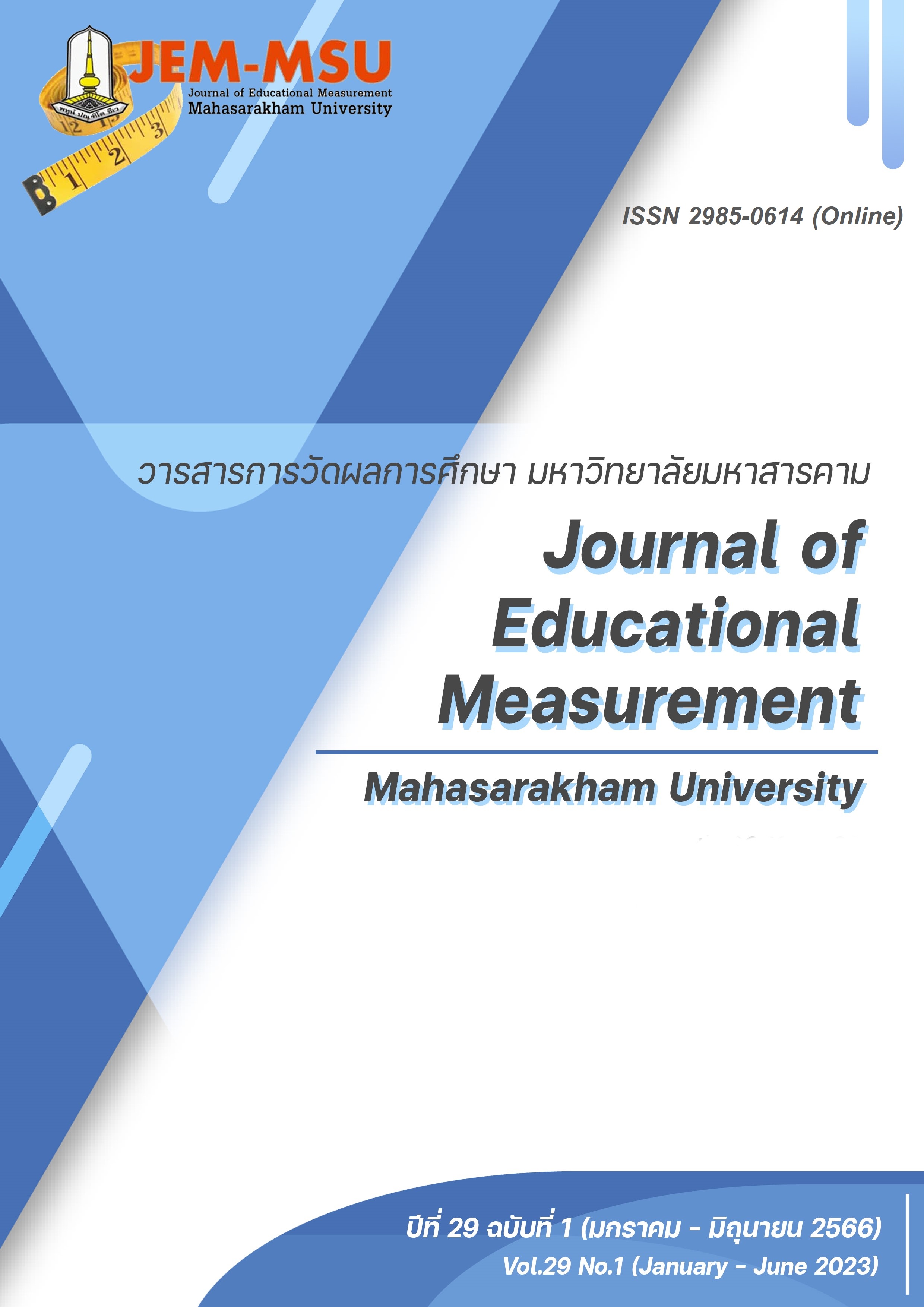การประเมินสมรรถนะของผู้เรียนในการเรียนรู้วิทยาศาสตร์
Main Article Content
บทคัดย่อ
การประเมินฐานสมรรถนะเป็นองค์ประกอบสำคัญของการศึกษาฐานสมรรถนะ ซึ่งเป็นการจัดการเรียนรู้รูปแบบหนึ่งที่เน้นการพัฒนาสมรรถนะผู้เรียนเพื่อแก้ปัญหาในโลกความเป็นจริง การประเมินฐานสมรรถนะมีลักษณะสำคัญห้าประการ ได้แก่ (1) เน้นประเมินการปฏิบัติงานและประเมินตามสภาพจริง (2) ใช้เครื่องมือวัดและเกณฑ์ที่หลากหลาย (3) เชื่อมโยงกับสถานการณ์ในโลกความเป็นจริง และติดตามการเปลี่ยนแปลงสมรรถนะของผู้เรียน (4) เป็นการประเมินรายบุคคล ที่เกิดขึ้นได้ทั้งก่อน ระหว่างและหลังเรียนรู้ และ (5) ให้ผลสะท้อนกลับเพื่อพัฒนากระบวนการเรียนรู้ของผู้เรียน การประเมินสมรรถนะของผู้เรียนในการเรียนรู้วิทยาศาสตร์สอดคล้องกับลักษณะข้างต้น ครูวิทยาศาสตร์ใช้แนวทางและวิธีการที่หลากหลายในชั้นเรียนของตนเอง เช่น การมอบหมายงาน การสร้างแผนผังมโนทัศน์ และการอภิปรายประเด็นทางวิทยาศาสตร์ บทความนี้เสนอการออกแบบการประเมินสมรรถนะของผู้เรียนในชั้นเรียนวิทยาศาสตร์โดยแบ่งเป็นสี่ขั้นตอน ได้แก่ ขั้นที่ 1 การระบุสมรรถนะ ขั้นที่ 2 การเลือกวิธีการและเครื่องมือประเมินสมรรถนะ ขั้นที่ 3 การสร้างเครื่องมือประเมินและรูบริค และ ขั้นที่ 4 การตรวจสอบคุณภาพเครื่องมือประเมินและรูบริค นอกจากนี้ บทความยังได้เสนอตัวอย่างเครื่องมือและรูบริค เพื่อสามารถประยุกต์ใช้กับบริบทที่แตกต่างกันอย่างเหมาะสม
Article Details

อนุญาตภายใต้เงื่อนไข Creative Commons Attribution-NonCommercial-NoDerivatives 4.0 International License.
เนื้อหาและข้อมูลในบทความที่ลงตีพิมพ์ในวารสารการวัดผลการศึกษา มหาวิทยาลัยมหาสารคาม ถือเป็นข้อคิดเห็นและความรับผิดชอบของผู้เขียนบทความโดยตรง ซึ่งกองบรรณาธิการวารสาร ไม่จำเป็นต้องเห็นด้วย หรือร่วมรับผิดชอบใดๆ
บทความ ข้อมูล เนื้อหา รูปภาพ ฯลฯ ที่ได้รับการตีพิมพ์ในวารสารการวัดผลการศึกษา มหาวิทยาลัยมหาสารคาม ถือเป็นลิขสิทธิ์ของวารสารการวัดผลการศึกษา มหาวิทยาลัยมหาสารคาม หากบุคคลหรือหน่วยงานใดต้องการนำทั้งหมดหรือส่วนใดส่วนหนึ่งไปเผยแพร่ต่อหรือกระทำการใดๆ จะต้องได้รับอนุญาตเป็นลายลักษณ์อักษรจากวารสารการวัดผลการศึกษา มหาวิทยาลัยมหาสารคาม ก่อนเท่านั้น
เอกสารอ้างอิง
Ab Rahman, A., Hanafi, N. M., Mukhtar, M. I., & Ahmad, J. (2014). Assessment practices for competency-based education and training in vocational college, Malaysia. Procedia - Social and Behavioral Sciences, 112, 1070-1076. https://doi.org/10.1016/j.sbspro.2014.01.1271
American Educational Research Association, American Psychological Association, & National Council on Measurement in Education. (2014). Standards for educational and psychological testing. American Educational Research Association. https://www.testingstandards.net/uploads/7/6/6/4/76643089/standards_2014edition.pdf
Ana, A., Yulia, C., Jubaedah, Y., Muktiarni, M., Dwiyanti, V., & Maosul, A. (2020). Assessment of student competence using electronic rubric. Journal of Engineering Science and Technology, 15(6), 3559-3570.
Carraccio, C., Wolfsthal, S. D., Englander, R., Ferentz, K., & Martin, C. (2002). Shifting paradigms: from flexner to competencies. Academic Medicine, 77, 361-367.
CBE Thailand. (2021a). Basic Education core curriculum framework (competency-based curriculum). https://cbethailand.com/
CBE Thailand. (2021b). Six core competencies. https://cbethailand.com
Davies, A., & Ellison, L. (2003). School leadership for the 21st century: a competency and knowledge approach. Routledge.
Drisko, J. W. (2014). Competencies and their assessment. Journal of Social Work Education, 50, 414-426. https://doi.org/10.1080/10437797.2014.917927
Gallardo, K. (2020). Competency-based assessment and the use of performance-based evaluation rubrics in higher education: Challenges towards the next decade. Problems of Education in the 21st Century, 78(1), 61-79. https://doi.org/10.33225/pec/20.78.61
Gervais, J. (2016). The operational definition of competency-based education. Wiley Online Library. https://doi.org/10.1002/cbe2.1011.
Guthrie, H. (2009). Competence and competency-based training: what the literature says. National Centre for Vocational Education Research.
Ilma, A. Z., Adhelacahya, K., & Ekawati, E. Y. (2021). Assessment for learning model in competency assessment of 21st century student assisted by google classroom. Journal of Physics: Conference Series. 1085(1), 1-8. https://doi.org/10.1088/1742-6596/1805/1/012005
Jonsson, A. (2014). Rubrics as a way of providing transparency in assessment. Assessment and Evaluation in Higher Education, 39(7), 840–852. https://doi.org/10.1080/02602938.2013.875117
Mathelitsch, L. (2013). Competencies in science teaching. Center for Educational Policy Studies Journal, 3(3), 49-64.
McClarty, K. L., & Gaertner, M. N. (2015). Measuring mastery: Best practices for assessment in competency-based education. Center on Higher Education Reform, American Enterprise Institute.
Motsenbocker, P. S. (2018). A comparative analysis of competency-based versus traditional assessment with respect to academic performance and feedback processes [Doctoral dissertation]. Concordia University. https://www.proquest.com/openview/9f8171ac8971ad6da6e47f262a333120/1?pq-origsite=gscholar&cbl=18750
Nitko, A. J. (2019). Educational Assessment of Students (8th Ed.). Pearson.
OECD. (2018). The future of education and skills education 2030: The future we walk. OECD Publishing. https://www.oecd.org/education/2030/E2030%20Position%20Paper%20(05.04.2018).pdf
Pearson’s CBE Solutions and Services. (2015). Defining competencies and outlining assessment strategies for competency-based education programs. Always Learning. Pearson Education, Inc. https://www.pearson.com/content/dam/one-dot-com/one-dot-com/ped-blogs/wp-content/pdfs/584G245_CBE-Assessment_WP_WEB_f.pdf
Trotter, A., & Ellison, L. (1997). Understanding competence and competency, in Davies, B. and Ellison, L. (Eds.) School Leadership for the 21st Century: A Competency and Knowledge Approach. Routledge.
Virk, A., Joshi, A., Mahajan, R., & Singh, T. (2020). The power of subjectivity in competency-based assessment. Journal of Postgraduate Medicine, 66(4), 200-205. https://doi.org/10.4103/jpgm.JPGM_591_20
Wolf, A. (1995). Competency-based assessment. Open University Press.
Ministry of Education. (2010). Basic Education Core Curriculum B.E. 2551 (A.D. 2008) (2nd Ed.). Agricultural Co-operative Federation of Thailand Limited. (in Thai)
Office of the Education Council. (2019). State of Education in Thailand B.E. 2561/2562 (A.D. 2018/2019) Educational Transformation in the Digital Age. Parbpim Printing. (in Thai)
Ritcharoon, P. (2019). Scoring Rubrics: The Tool for Teachers to Accurately and Fairly Evaluate Learning Outcomes. STOU Education Journal, 12(1), 1-16. (in Thai)
Royal Academy. (2012). Education Dictionary Royal Institute Edition. Aroonkarnpim Limitted Partnership. (in Thai)
Ruchaiphanit, W. (2016). Thailand launched a Study into the Issue of Quality Education. Journal of Research for Development Social and Community Rajabhat Mahasarakham University, 2(6), 2-8. (in Thai)


